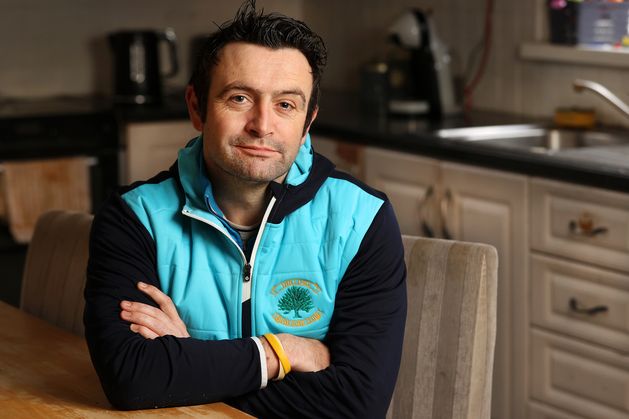“Invisible Interviews: The Graham Story” documents Graham Kirk’s life with Niemann-Pick disease.
Rush native Graham Kirk was diagnosed with Niemann-Pick Type C in 2010. He received his diagnosis after his sister Paula was diagnosed with the same disease.
I was diagnosed because my sister had it. He was extremely powerless with it. “In the end, he couldn’t sleep, got pneumonia and passed out.” said Mr. Kirk.
“Fortunately, I was able to see what happened to him and did the opposite.”
Invisible Interviews: The Graham Story Produced by the Niemann-Pick UK (NPUK) charity. It was also nominated for the Smiley Charity Film Award in March.
“Great. What we want to do is just ring the bells and shout as much as we can to raise awareness about this disease.”
I am very fortunate to have my support network of family and friends. And the charity itself, to be associated with any charity, I’m glad this is one.”
The documentary was shot with only one camera in Mr. Kirk’s home, and it went up against bigger and more expensive productions every step of the way to Cannes.
I never thought we would even go this far. The Smiley Awards had a bit of a buzz last month and are now being incorporated into the Cannes Film Festival.
We really did not expect to be with the best films of the Cannes Film Festival, and the competitors in this section are from Japan, Italy.
The big names who are head and shoulders above us in terms of what they can spend to make a film.
“What we were looking for in the end – and the funding eventually increased – was a documentary that was face-to-face, hopefully sharing my story with the camera and the world.”
Mr. Kirk has taken several steps to reduce stress in his life to help manage Neiman Peak. He no longer works, has adopted a healthier lifestyle since his diagnosis and is still able to go to the gym.
“Nothing is the same for every patient,” he said.
“My diagnosis is bad, yes, and I have Neiman Peak, but I know there are patients who wake up every day, have to come in a bag, carry a bag, carry an oxygen tank, in a wheelchair.
“There are extreme cases, while I am very lucky.”
Neiman Peak can lie dormant in the body for years before being triggered by a trigger. For Paula, the stress of sitting the Leaving Cert brought this to light.
It was all downhill from there. “His mobility, hand-eye coordination, everything was missing.” said Mr. Kirk.
“While I have been fortunate enough to see it all through and fight the good fight.”
Mr Kirk said that getting treatment and research progress for rare diseases such as Niemann’s Peak can be difficult.
“Treatment is an issue across rare diseases, not just Niemann Peak. Ireland is not really a major player in drug development, we don’t focus on developing rare disease drugs because they are very expensive.
“It’s a battle for charities to get funding, it’s always going backwards because it’s such a rare disease.”
The documentary has done a lot to raise awareness, reaching over 165,000 views worldwide on TikTok alone.
“With that being said, you’re just looking at exposure and trying to raise as much awareness as possible, we’re not looking to monetize this. It started from a very small base and has grown exponentially.” Is.”
Niemann-Pick affects around 70 or 80 people in the UK and only four or five have been diagnosed in Ireland. Niemann-Pick type C affects one in 120,000 people, but NPUK said this may be an underestimate.
Although he now wears a hearing aid, Mr Kirk said he feels guilty when he attends the NPUK annual conference and sees how the condition affects other people.
“At first you’re given a badge – pink for patients, green for volunteers and blue for family members. I sat down and another lady said to me, ‘I think you’ve got the wrong badge’. It’s kind of a compliment but in At the same time, it is embarrassing.
“You come back from a conference and you feel a little guilty because you’re doing so well and everyone around you is struggling. I feel bad for the parents whose kids are in wheelchairs going to care and respite. They don’t have a lot of time with them and They also know this.”
Mr. Kirk is an ambassador for the International Niemann-Pick Disease Registry (INPDR), an initiative aimed at documenting the physical progression of the disease involving both patients and physicians.
INPDR’s work has been instrumental in increasing awareness and understanding of Niemann Peak due to its rarity, creating an international effort to advance research and improve clinical care.
#documentary #Dublin #man #living #rare #genetic #disease #selected #Cannes #Film #Festival
